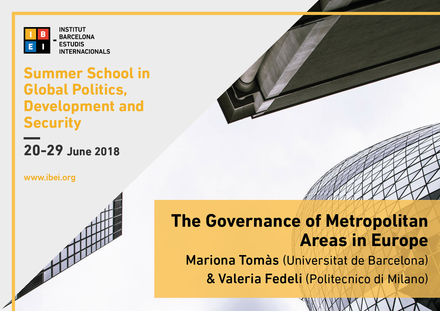The Governance of Metropolitan Areas in Europe
10 hour course
Mariona Tomàs (Universitat de Barcelona)
Valeria Fedeli (Politecnico di Milano)
June 25 – 29 (11.30 am – 1.30 pm)
The world is becoming increasingly urbanised; the accelerated expansion of the metropolitan regions is a visible phenomenon in the 21st century. As a result, the economic, social, cultural and environmental transformations in the last decades have led to profound new territorial reorganisation processes ranging from new patterns for the location of urban activity to the appearance of significant changes in the role of metropolitan areas. In this context, the challenges of cities are posed on a metropolitan scale and not only locally. How are metropolitan areas governed? Which are their competences and political role? The objective of this course is to analyze the models of metropolitan governance from a comparative perspective, examining their advantages and disadvantages and through concrete examples.
Metropolitan governance models can be classified according to their degree of institutionalization (from highest to lowest): metropolitan governments, sectorial agencies, vertical coordination by other levels of government and voluntary cooperation between municipalities. There are different elements that influence the models of metropolitan governance: competences (exclusive or shared, in hard policies or soft policies, with binding capacity or not), financing (own or external sources), multilevel relations (horizontal and vertical), citizen representation and participation (direct or indirect election of representatives, inclusion of other public and private actors). The combination of these elements configures the metropolitan governance model, which transforms over time and adapts to the specific institutional context.
There are not many examples of metropolitan governments in Europe. Barcelona, for instance, is one of the exceptions, with its limitations. However, recent reforms in England, France and Italy have meant the creation of new metropolitan institutions. Are we facing a new gold age of metropolitan institutionalisation? Are States finally recognising the political role of metropolitan areas? These and other related questions will be discussed in the course.
Download the Reading List (pdf)
With the support of:


